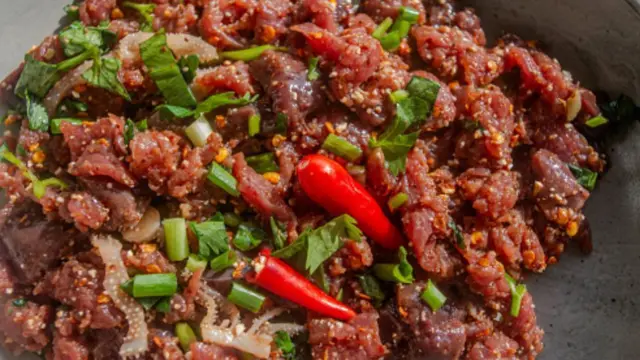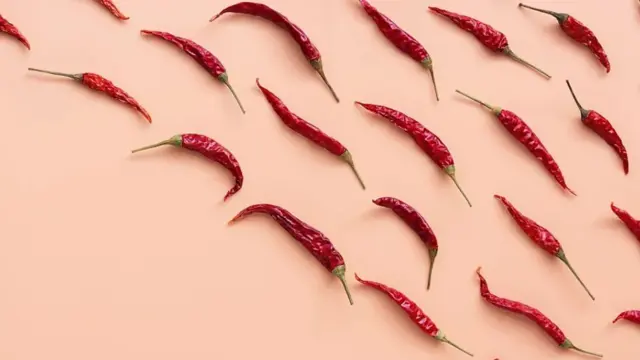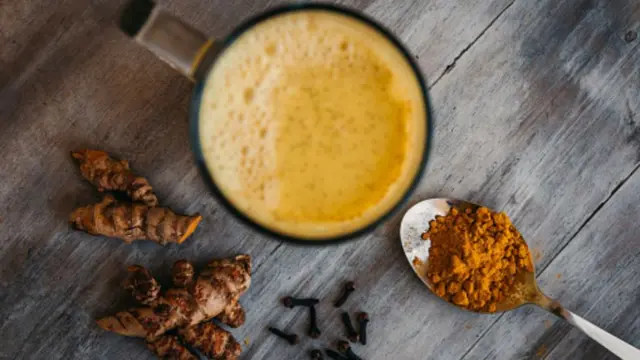
Wia dis photo come from, Getty Images
Reports say that chilli, turmeric and oda spices have health benefits and even the ability to “strengthen our immune system”.
But do spices really have health benefits in our food, or do they help prevent illness?
Spices have been part of our diet for thousands of years – it’s common to sprinkle our chips with pepper, drink ginger tea and add chilli to our food.
But recently, spices have been promoted from everyday foods to superfoods with healing powers.
It is reported that Hillary Clinton bin eats one pepper every day during her campaign to be the president of the US for 2016, as an effort to prevent diseases.
Turmeric, which has been used in Asia for decades, has found its way into coffee shops around the world in the form of “golden lattes” – and, during this epidemic, many viral messages saying that it is “fit” to strengthen your immune system “As well as protect the pipe from getting sick. “It’s everywhere now,” according to one celebrity chef.
Meanwhile, cayenne pepper hasn’t made a comeback since the Beyoncé diet was debunked in 2013, suggesting that a combination of cayenne pepper, maple syrup, lemon and water enough to reduce weight.
But do spices really have health benefits in our food, or do they help prevent illness? And is there anything that can be harmful to our body?
These are the health benefits of chilli peppers

Wia dis photo come from, Getty Images
One of the most popular and widely used spices is chilli pepper. Many studies have examined the possible effects on our health – and sabi pipo has discovered that it has both good and bad results.
Capsaicin is the main active ingredient in chillies. When we chop a chilli, the capsaicin molecules interact with the heat receptors in our body, and then send signals to the brain to create a sensation of heat.
Some studies say that capsaicin is good for helping pesin live longer.
Another 2019 Italian study found that eating foods containing pepper four times a week had a lower risk of death compared to those who did not eat foods containing pepper.
And in 2015, Chinese researchers, who looked at the health of nearly 500,000 Chinese people, found that eating chilli is associated with a lower risk of death.
Fried foods that are fried almost every day reduce the risk of dying by 14% than those that are eaten with less spices once a week.
Researcher Lu Qi, professor of nutrition at the Harvard School of Public Health, researcher Lu Qi says: .
Let’s say nothing, eating a lot of pepper to protect pesin’s health – or protect pesin from respiratory diseases – in the short term.

Wia dis photo come from, Getty Images
It is important to remember that China’s scholarship program follows the pipeline for an average of seven years each. However, even if chilli can have protection for participants, it should not be for weeks or months.
Several studies also say that capsaicin is enough to increase the energy we burn and reduce our appetite.
Zumin Shi, an assistant professor in the department of human nutrition at Qatar University, found that people who eat cheese reduce the chances of obesity and are useful for high blood pressure. So when he learned about the effects of using pepper on mental performance, he would expect a trick.
But when he measured the cognitive performance of Chinese adults against chilli consumption, he found that people who ate more chillies were less cognitive.
It means that a person who consumes more than 50g (1.8oz) of chilli a day is at risk of memory loss. It is important to note that self-reported data is considered unreliable.
The burning sensation that scientists have been feeling for a long time is still amazing. It also gives us a clue as to why chilli is associated with mental decline: the feelings caused by plants trying to protect themselves from diseases and insects.
“Although many of the pigments and bitter flavors we enjoy for food are preserved to protect the plants from burning, we are used to levels of flavor toxicity – we can handle many compounds of plants, including tannins for black tea, while other types are not suitable.”
Although some studies have produced encouraging findings, another 2022 review of 11 reviews concluded that the health effects of consuming capsaicin and spicy foods are unclear, and the evidence suggests that when “very high quality”.
These are the health benefits of turmeric

Wia dis photo come from, Getty Images
Another well-known spice that pipo claims to have beneficial effects on human health is turmeric. It is often associated with curcumin. One small molecule is in turmeric. Dem is often used for other medicines to treat inflammation, stress and many other conditions.
Strong evidence that turmeric is beneficial, is not.
Many studies show that curcumin has anti-cancer effects in the laboratory. But the lab environment is very different from the human body.
And researchers say im bioavailability is too low to get health benefits.
However, some researchers have found the health benefits of supplements that include high doses of certain spices – they have found positive results.
For example, one 2023 study found that taking a ginger supplement daily helps control inflammatory bowel disease and autoimmune diseases including lupus and rheumatoid arthritis.
Clauses of connection causation

Wia dis photo come from, Getty Images
For Western countries, the increasing interest in spices including turmeric as alternative medicine can be seen in the Middle Ages, as some reasons say that spices have healing powers, Paul Freedman, professor of history at the University of Yale
Chilli and turmeric have been studied extensively, but most trials are based on data on consumption and various health outcomes, without separating cause and effect. And research done for laboratories doesn’t necessarily translate to the human body.
And as is true in most nutritional studies, it is difficult to establish cause and effect.
Take the 2019 Italian study showing a lower risk of death associated with pepper consumption. They are bystanders, so it is impossible to know if eating cheese makes people live longer or if there is something else they are doing at work.

Wia dis photo come from, Getty Images
Studies have also found that adding spices to burgers creates fewer free radicals that cause cancer in the body than chopping burgers without spices, and makes the meat more do not cause cancer. But these benefits are simply explained by the properties of spices called Mellor, which are not part of the study.
“Spicing meat in a popular way to preserve meat,” he said. Therefore, some of the benefits of spices can help preserve food, and make us not get direct benefits for ourselves.
Many researchers believe that the health benefits of spices actually come from the food we eat. For example, spices are suitable for salt, Lipi Roy, assistant professor of medicine at NYU Langone Health in New York, talks.
“Spices make food sweeter, tastier, and more wholesome than salt,” he said.
#Eating #pepper #turmeric #spices #health #benefits #BBC #News #Pidgin